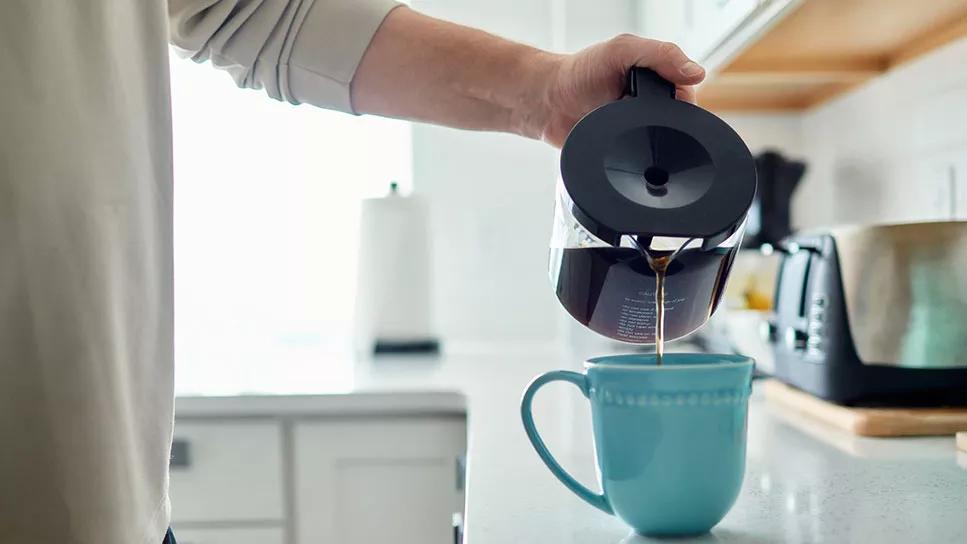It’s all about the amount — try to stick to 100 to 150 milligrams a day to reduce and prevent a pounding, throbbing head

Image content: This image is available to view online.
View image online (https://assets.clevelandclinic.org/transform/f092aeec-271f-4a0f-a46f-fefed94d56c7/pouring-coffee-morning-1300229083)
Close up of person pouring a cup of coffee
Many of us are fueled by caffeine — a couple cups of coffee, a soda for lunch and maybe an energy drink if we’re really dragging and need a boost.
Advertisement
Cleveland Clinic is a non-profit academic medical center. Advertising on our site helps support our mission. We do not endorse non-Cleveland Clinic products or services. Policy
But what if your head is pounding and throbbing? Does caffeine help headaches?
Yes and no. In fact, there’s a case to be made that some caffeine can actually help keep some types of headaches at bay. So, how much should you be drinking?
Headache specialist Emad Estemalik, MD, explains what’s the right amount of caffeine and how it may help with certain kinds of headaches.
First, let’s start with how much is a good amount: Research shows that around 100 to 150 milligrams of caffeine (which is equivalent to a small cup of coffee) tends to help reduce and even prevent headaches.
And that’s thanks to how caffeine constricts the blood vessels in your brain, says Dr. Estemalik.
“For example, if you have a migraine, the blood vessels in your brain are dilated (or more open),” he explains. “The right amount of caffeine can constrict (or narrow) the blood vessels — so the caffeine is acting as a vasoconstrictor.”
Yes, too much caffeine can lead to headaches.
“If you get into larger amounts of caffeine, then it can have the opposite effect — bringing on a headache and increasing the frequency of headaches,” warns Dr. Estemalik. “And it’s not just coffee, but any caffeinated beverages or energy drinks.”
Advertisement
Also, you may experience a headache if you quit caffeine cold turkey or don’t maintain the same level of caffeine daily.
“If your body is used to a daily consumption of caffeine and you abruptly stop, you will often feel some minor withdrawal symptoms like irritability, sleep disturbance and headaches,” shares Dr. Estemalik. “The good news is those symptoms usually don’t last more than a few days.”
Another tip? Dr. Estemalik says that while it’s important to focus on how much caffeine you consume, you also want to try to avoid caffeine late in the afternoon or at night.
“Having caffeine later in the day can cause sleep disruptions,” he notes.
Yes, says Dr. Estemalik. Caffeine can help with tension headaches and migraine headaches. Vasodilation, or the dilatation of blood vessels, happens during these types of headaches. And caffeine constricts blood vessels, acting as a vasoconstrictor.
But when it comes to cluster headaches, caffeine doesn’t help. And that’s because the pathophysiology, or the physical and function changes that happen during a cluster headache, are different from tension headaches and migraine headaches.
While healthcare providers don’t know the exact reason you may get a cluster headache, it’s believed to be caused by certain chemicals being released in your body.
Also important to know? Caffeine won’t help a sinus headache.
“The pressure you feel with sinus-related headaches means you have a disequilibrium of pressure in the nasal sinuses,” explains Dr. Estemalik. “And that’s what causes a lot of these headaches and frontal pressure for people.”
Headaches can cause pain and disrupt your life. You may just get the occasional headache, but if you have to deal with them more often than not, it can be frustrating.
And while the right amount of caffeine can be beneficial to managing your headaches, it shouldn’t be your only line of defense.
Dr. Estemalik says that if you have chronic headaches (defined as more than 15 days a month), then it’s time to talk to your healthcare provider about a preventive strategy to reduce the frequency of your headaches. They may recommend certain lifestyle changes, discuss triggers to avoid and prescribe an abortive and/or preventive medication.
“It’s important to have the right abortive medication for when you have a headache, and you really want it to work quickly so your headache doesn’t progress,” says Dr. Estemalik.
“But it’s also important to know that when it comes to over-the-counter medications or prescription triptans, the overconsumption of any of these medications (more than two to three times a week) can have adverse effects in increasing the amount of headaches, which is called a rebound or medication overuse headache.”
Advertisement
Don’t hesitate to talk to a healthcare provider. They can help you navigate the world of headaches and help find the right path to more headache-free days.
Advertisement

Sign up for our Health Essentials emails for expert guidance on nutrition, fitness, sleep, skin care and more.
Learn more about our editorial process.
Advertisement
Exercising, hydrating and other natural remedies can help a headache without the meds
Certain components found in wine like tannins and histamines may be the culprit
TMJ pain can cause headaches, but chiropractic treatments, lifestyle adjustments and medication can help ease discomfort
Dehydration, spinal fluid leaks and other conditions can cause positional headaches when you stand up
Many factors, like dehydration, a cold or even your medication, can result in these common symptoms
Behind your eye, on one side of your face or as a band around your head — headaches are no fun
Yes, especially if you get migraines — but medicine can help
If it isn’t a hangover or teeth grinding, your aching head might be a sign of a sleep disorder
Although it could be used as a moisturizer, this new trend is not recommended
Communicating clear limits helps protect your time, energy and emotional well-being
High cholesterol can be genetic, but testing and treatment can lower your heart disease risk